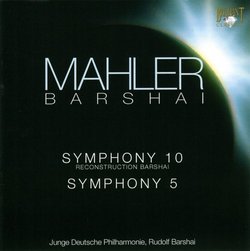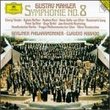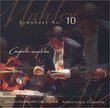| All Artists: Mahler, Barshai, Junge Deutsche Philharmonie Title: Symphony 10 & 5 Members Wishing: 1 Total Copies: 0 Label: Brilliant Classics Release Date: 6/29/2004 Genre: Classical Style: Symphonies Number of Discs: 2 SwapaCD Credits: 2 UPC: 842977022056 |
Search - Mahler, Barshai, Junge Deutsche Philharmonie :: Symphony 10 & 5
 | Mahler, Barshai, Junge Deutsche Philharmonie Symphony 10 & 5 Genre: Classical
|
Larger Image |
CD DetailsSimilar CDs |
CD ReviewsTruly impressive T. J. Friedman | Tallahassee, Florida | 02/04/2007 (5 out of 5 stars) "I echo the splendid remarks made concerning the truly accomplished performances and sound quality in both the fifth and tenth symphonies. What I wish to add is that the Barshai tenth is without a doubt the first version of this reconstruction that I have had the pleasure of listening to, that I have felt to be a fully realized conception of what Mahler might have written, had he lived to complete this elusive work. This is because the various incarnations by Cooke that I have heard, fine as they were, have always sounded somewhat flat, lacking originality in orchestration and tonal variety due to being done in a careful, musicological mainstream manner with the view that nothing the master wrote should be changed anymore than absolutely necessary and that where possible, bits and pieces of prior writings are the best way to flesh out new work. Performing editions which fail to take into account that Mahler was continously forging ahead in new directions and recycle old ideas render Mahler's compositional progress finished prior to the start of the composition of this symphony (at the end of Das Lied). The musical establishment, particularly the British one, is conservative and has generally opted for being scrupulous (itself a noble sentiment) not to venture into any "new" territory not specifically sanctioned by a composer. However, to do so slavishly without taking into account that Mahler was likely doing so, at least based upon those portions of the original sketches of the 10th score that I have seen, seems to me to be unduely careful and results in boring reconstructions. After all, Mahler's colleagues were Webern, Berg, Stravinsky and the like, and they definitely were in the process of eschewing tonality. Mahler must have been aware of this. Music was changing forever and Mahler certainly could not have intended to be left behind. He spent his entire career being in the forefront of modernists. One need only look at the beginning of his career, when he interacted and some would say, freely borrowed, from his colleague Hans Rott, to see that he was most definitely influenced by his peers to strike out in directions that were years ahead of the current musical establishment of the time. As a result, it seems to me to be a shame that our musical establishment should render Mahler conservative reconstructions of his music, even today. I prefer this somewhat radical Barshai view of Mahler any time. His version his been prepared one with the requisite knowledge and performance experience needed for this task. His is a Mahler tenth that will grow more interesting with repeated listening, rather than the clinical Cooke versions that have frankly staled with age." Superior A. Yen | MA, USA | 02/05/2007 (5 out of 5 stars) "Live recordings capture the moment unlike a studio job. Unfortunately the other contender for contemporary Best Live Mahler 5 falls quite flat: Abaddo's Mahler 5 on DG is somewhat banal and sounds like a second-pressing. This recording, on the other hand, has as close to everything you could get in one recording of Mahler 5 (more on 10 later). With vibrant string playing, intense brass, sensitive woodwinds, and an overwhelming percussion sound at the big moments, this is a serious orchestra. I get to hear some of the best young players around in my area's youth orchestra, so I know there is amazing talent in the world. This is a college-age orchestra, but just like the best youth orchestra here in my place (which, unlike this orchestra, does not accept players older than 19), on recording, you can never tell it wasn't adults behind the stands. Incredible playing aside, this recording's sound quality captures nuances galore. Perhaps not every single detail is audible, but this is NOT one of your milked studio recordings where details, rather than complimenting the recording, pop out at you and sock you one to the jaw. As for Mahler 10, I must say that if you are interested in Barshai's reconstruction, then by all means check it out. I personally think the first movement, (which seems, to my ears, to follow the original Mahler orchestration) is a tad slow, losing a bit of the lilt and "funkiness" of the strangely dark waltz tunes, for example. The rest, since it contains various differences, I really don't know much about; it is safest to assume you want this disc for the Fifth Symphony. If it's the Fifth you want, buy this ridiculously cheap recording now." Great overall performance for a dismatched bargain price. -Ashi- | San Jose, CA United States | 03/20/2007 (4 out of 5 stars) "I've listened to several versions of Mahler's 5th. This one is among the top. I should point out that Barshai's adagietto (from Symphony No. 5) may be a surprise to some who are familiar with the piece. The overall tempo is certainly okay (flows like a love song, instead of a funeral march, said another reviewer), but the use of rubato is a little distracting. While it injects a nice dose of energy into the piece, one must question whether a Chopinesque approach is right for Mahler. That's the only thing that prevents me from giving it a five-star. Otherwise, the reconstruction work for the 10th is marvelous. The performance of the symphony overall is certainly quite a pleasant treat. The bargain price tag certainly does not reflect the quality.
The pamphlet insert contains a nice little intro for the reconstruction (of Symphony No. 10), and a praise for the 5th." |

 Track Listings (5) - Disc #1
Track Listings (5) - Disc #1![Mahler: Symphony No. 10 [Performing Version by Deryck Cooke]](https://nationalbookswap.com/cd//m/58/6858/6136858.jpg)



